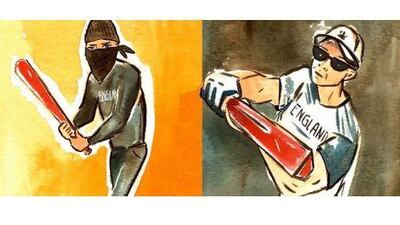Ruthless, rampaging, relentless. These are all words you will have become familiar with in The National's coverage of the riots that tore through the streets of London last week, and then coursed through cities across the rest of England, spreading like a beastly and unwanted plague. More of that can be found on page four of this week's issue, as Dan Hancox seeks to bring understanding to the seemingly mindless acts of violence that shook parts of the United Kingdom.
What may be more surprising is that these same words were simultaneously being applied to a group of Englishmen partaking in the sport of cricket, that most genteel and gentlemanly of summer pursuits.
For the past few weeks, the England international cricket team have been competing in a series of test matches with their Indian counterparts. The former are the current champions of the shortest form of the game (Twenty20) and were, at the beginning of the summer, one of the highest ranked teams in its longest format (five-day tests).
India, meanwhile, are the current world champions in the one-day version of the game and had been top of the pile in test matches before hostilities began.
Something had to give - and it did, albeit in the most unexpected of fashions.
The English cricket team have bullied, bossed and, in Birmingham last weekend, crushed a collection of Indian superstars into the most humiliating of submissions. If you have followed any of the action on OSN, you will know it has been equals parts terrifying and terrific - England have been that good and India that bad.
Indeed, the deep malaise that has swept suddenly over the Indian team has been so overpowering and so unexpected, it prompted Dileep Premachandran to ask "How do you solve a problem like India?" last week in The National's sports pages. How, indeed?
The good news for those of us living here who happen to love the game and want to see the best perform in our neck of the woods, is that the England team will touch down on these shores at the beginning of next year to play a series of competitive matches against Pakistan. The teams will duel in the sunshine of Abu Dhabi and Dubai throughout January and February.
Pakistan, the number six ranked team in the world, will also play Sri Lanka, world number four, in an autumn series in the Emirates beginning in October.
The England tour, in particular, is great news for the nation's hoteliers. The so-called Barmy Army of supporters will travel in their thousands from the UK and offer vociferous support to their heroes. It is also good news for those same fans. Rarely before have they had to contemplate such a geographically compact overseas tour schedule.
The recent success of the England team is, nevertheless, a blow for at least one set of cultural commentators who are used to using cricket as a barometer for the relative health of English society. In days gone by, the England team have not just been bad, but very bad - the side hit rock bottom a dozen years ago after a humbling home defeat by New Zealand and have been up, down and now up again, ever since - and their serial misadventures have often been cited as a sign of the deep depression that has long hovered over the country.
But what now? England itself is at the mercy of packs of aggressive young pups barking through its town centres, yet its cricket team is the envy of the world, the dogs of a very different war.
It is hard to draw any meaningful parallel between the street and the sporting stadium, except to say that in both cases what we have witnessed is, to use a phrase in common usage, "just not cricket".
It is, in fact, altogether much better and much worse than that.


